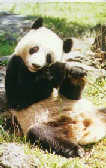It belongs to the Ailuropodidae family of Carnivora order. Its scientific name is Ailuropoda melanoleuca (Latin), or Giant Panda, or Bamboo Bear (English)
 The body length of adult male is150 to 180 centimetersand the height of shoulder is 65 to 70 centimeters. The tail is 12 to 14 centimeters long. Generally it weighs 80 to 125 kilograms, and the female is 10 to 20 percent smaller than the male. The form of the body is like the black bear, with round and large head and rather short tail. Its trunk and tail are white, while the ears, eyes and four limbs are black.
The body length of adult male is150 to 180 centimetersand the height of shoulder is 65 to 70 centimeters. The tail is 12 to 14 centimeters long. Generally it weighs 80 to 125 kilograms, and the female is 10 to 20 percent smaller than the male. The form of the body is like the black bear, with round and large head and rather short tail. Its trunk and tail are white, while the ears, eyes and four limbs are black.
Inhabiting in high mountain forests at an elevation of 1,300 to 3,600 meters, it is most often seen in mixed broadleaf-conifer forests under which there are arrow bamboos, square bamboos or other canebrake. Except estrous period, it leads a solitary life, good at climbing trees and swimming. Its main food is bamboo and bamboo shoots, as well as Chinese gooseberry and other fruits, and once in a while it also eats dead animals. The oestrus is from the last ten days of March to the middle ten days of May. The gestation period lasts 97 to 163 days. The actual growth of the embryo is about 1.5 month. It procreates once every 2 years, with generally one baby per fetus, once in a while two babies. The newborn baby weighs only 90 to 130 grams; it begins to eat bamboo 5 to 6 months after birth and is ablactated at the age of 8 to 9 months. At about 18 months old it leaves its mother. In general, it grows to sexual maturity at the age of 55 to 65 months. Under breeding condition, it has a lifespan of 26 years.
Giant panda is a precious and rare animal endemic to China and in the verge of extinction, only distributed in Sichuan Province, Gansu Province, and Qinling of Shaanxi Province, with the present quantity of about 1000.
 Belonging to national first-grade animal species under protection, it has been listed in Appendix I ofInternational Trade Convention on Endangered Wild Animal and Plant Species. Owing to great difficulty in propagation, the quantity under artificial breeding condition is limited. By far, zoos and farms of natural protection areas in China and abroad, have obtained more than 240 of Giant Pandas from open fields, for the requirements of exhibition, breeding and research. At present there are less than 100 heads under artificial breeding (including self-bred quantity).
Belonging to national first-grade animal species under protection, it has been listed in Appendix I ofInternational Trade Convention on Endangered Wild Animal and Plant Species. Owing to great difficulty in propagation, the quantity under artificial breeding condition is limited. By far, zoos and farms of natural protection areas in China and abroad, have obtained more than 240 of Giant Pandas from open fields, for the requirements of exhibition, breeding and research. At present there are less than 100 heads under artificial breeding (including self-bred quantity).
